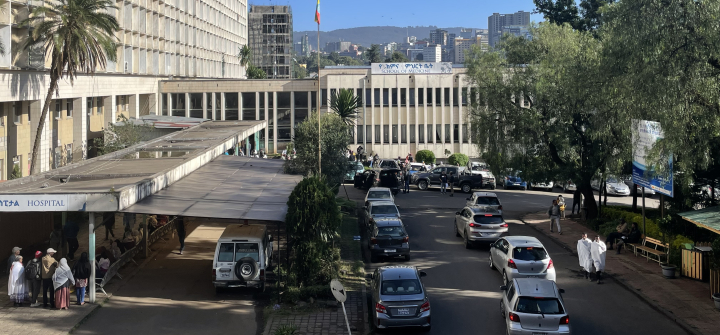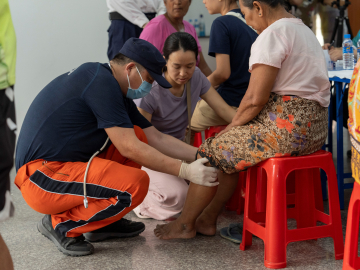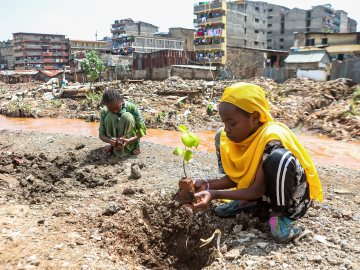A Forgotten, Yet Life-Threatening Infection
A young man gasps for air, his limbs flailing across the stretcher. Doctors and nurses swarm around his withered frame, placing monitors and attempting to start an IV.
I traveled to Addis Ababa in 2022 to teach medicine, but this is one of the many times that I became the student. What could the diagnosis be? He has a fever. Elsewhere in the country, I would suspect malaria, but the high altitude in Addis makes it less likely. Pneumonia, tuberculosis, typhoid, meningitis; countless illnesses come to mind.
The infection has caused his lungs to fail; the team prepares for intubation.
“Relapsing fever,” a resident whispers to me. I pull out my phone to check my old exam notes. “That one,” he says, pointing to the single flashcard that has appeared, “louse-born relapsing fever.”
LBRF is caused by Borrelia recurrentis bacteria; body lice are the vectors for human-to-human spread of the infection. Common symptoms include high fever, headache, and muscle aches. The distinguishing feature is the return of fever multiple days apart. Cases left untreated or delayed in receiving care can result in organ failure, which can be fatal.
Recorded cases of LBRF date back to the age of Hippocrates, and the disease has continued to crop up in different continents throughout history. After World War I, epidemics killed 5 million across Europe, the CDC reports.
Ethiopia and neighboring countries continue to face outbreaks. Aklilu Azazh, MD, a global leader in emergency medicine and a professor at Addis Ababa University, recalls such outbreaks earlier in his career. “The context a decade ago was due to internal migration of people to cities and living on streets and unhygienic crowded situations,” he explained during an interview in February. With forced displacement on the rise in recent years, outbreaks have returned.
I look at the young man on the stretcher. He now lays motionless, apart from the rhythmic up and down of his chest, as the ventilator breathes for him. He had the risk factors: displaced from his home, living between shelters, no family to recognize that he needed treatment.
For those who present early, treatment is simple—a single dose of procaine penicillin. The lab checks the man’s blood sample under a microscope to confirm the diagnosis. Despite the quick response from the team, it was unfortunately too late. He did not survive.
When I returned to Addis in 2023, I spoke to Kalkidan Zenebe, MD, a physician studying LBRF in the emergency department. “Most patients who come to our hospital are young and have severe complications,” she says.
Her research identified over 170 patients with LBRF who came to emergency departments at two hospitals in Addis from August to November 2023. Over 4% of these patients did not survive, consistent with a previously published mortality rate of 2–5% for treated patients and up to 40% in untreated patients. Each case of LBRF is reported to public health officials.
Temesgen Beyene, MD, chair of the Department of Emergency Medicine at Tikur Anbessa Specialized Hospital, hopes to see more research. “It really brings important findings for the policymakers. It can also bring resources for managing outbreaks,” he told me in a February interview.
Conflict and forced displacement have a critical role in the spread of vector-borne diseases like LBRF. Physicians in Europe have published case reports of relapsing fever in refugees arriving from North Africa—reminders that the infection can show up anywhere.
Zenebe and her colleagues are leading the world in better understanding this forgotten, yet life-threatening infection. They are planning to complete further research and to collaborate with public health colleagues to better identify needed policies and interventions. There is a need for public education on reducing spread of body lice and recognizing infection to improve early access to treatment.
“There are many infections on the list of neglected tropical diseases, but relapsing fever is not there. Anywhere. But it is killing people,” Azazh describes, emphasizing the need for the WHO to include LBRF on this list. A preventable and treatable disease should not be yet another barrier faced by displaced populations. It is time to put an end to the outbreaks.
Julianna Deutscher, MD, is a Global Emergency Medicine fellow at Queen’s University and MPH student at the Johns Hopkins Bloomberg School of Public Health. In addition to her work as an emergency physician, she contributes to global health projects focusing on medical education, migrant and refugee health, and human trafficking prevention. Julianna will be developing further stories as the upcoming Pulitzer-Hopkins Bloomberg Global Health Reporting fellow.
Join the 50,000+ subscribers in 170+ countries who rely on Global Health NOW summaries and exclusive articles for the latest public health news. Sign up for our free weekday newsletter, and please share the link with friends and colleagues.
Tikur Anbessa Specialized Hospital, Addis Ababa University medical campus. October 2023. Julianna Deutscher





